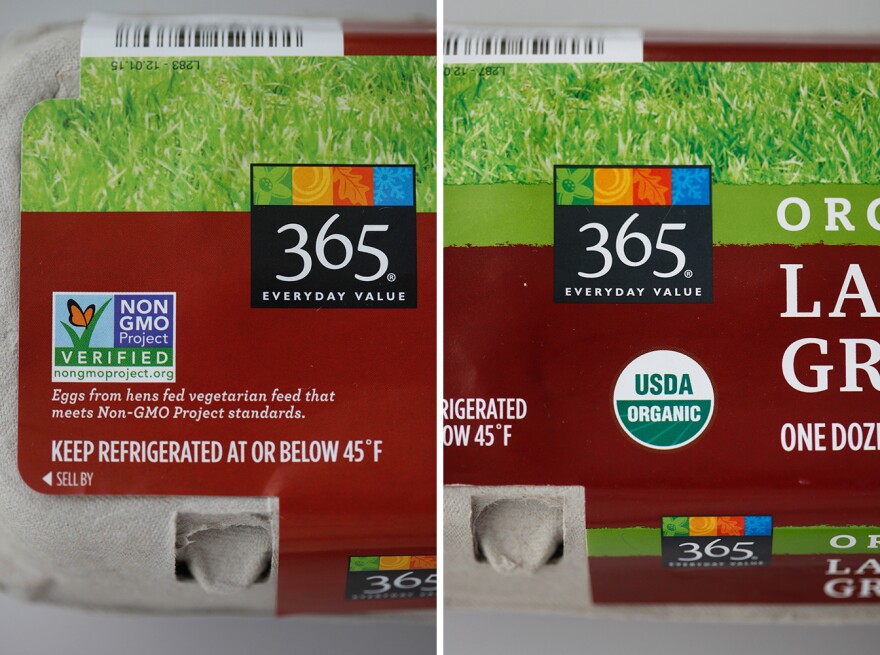I did a little experiment the other day. I stood outside a Whole Foods Market in Washington, D.C., with two cartons of large brown eggs. One carton had the words "Non-GMO Project Verified" on it, with a little orange butterfly. It also said cage-free. The other carton had a different label; a green and white circle with the words "USDA Organic." One other crucial difference: the organic carton cost 50 cents more.
I asked shoppers which carton they would buy.
"They both sound good," says Anna Hansen, sounding indecisive. "If it's non-GMO, great. If it's USDA organic, great. I don't know!" Then she pointed at the non-GMO carton. "This one's a little cheaper, I guess I'd go with this one."
Most of the shoppers I met made the same choice, and they're joined by millions of shoppers across the country. "We've seen exponential growth since our label first launched in 2010," says Megan Westgate, Executive Director of the Non-GMO Project, which is responsible for that label on the eggs. "We're currently at about $16 billion in annual sales of products that have the butterfly on them. Just two years ago, we were at $7 billion."
Organic food sales are growing, too, but not as rapidly. And it's creating some soul-searching among organic companies, some of which actually launched the Non-GMO Project because they wanted to have their products tested for the presence of GMOs. The official organic rules, while they prohibit the use of genetic engineering, do not require organic food companies to test their ingredients for the presence of GMOs.
"There's a concern, for sure, that consumers are getting ripped off, or that they're not getting what they think they're getting," says Dag Falck, the organic program manager at Nature's Path Organic Foods.
The non-GMO label has always had its critics. Some people say it's misleading because it implies that non-GMO foods are better for you. Scientists and the U.S. Food and Drug Administration have said repeatedly that this is not true.
Now, organic food companies are starting — cautiously — to voice concerns about the non-GMO label, too. They're worried that shoppers have become so fixated on GMOs that they don't realize how little it actually means, compared to organic.
"It's a little frustrating, to be honest," says Jesse LaFlamme, CEO and owner of Pete and Gerry's Organic Eggs. "OK, it's great that there's a non-GMO symbol on there. But do you understand that that product might have been produced with pesticides, antibiotics, and with no regard for animal welfare?"
Laura Batcha, executive director of the Organic Trade Association, puts it this way: "Non-GMO is agriculture before GMOs were introduced, which is still chemical agriculture."
A good place to see what this means, in practice, is the farm near Cerro Gordo, Ill., where Allen Williams grows corn, soybeans and a variety of other crops. It's an unusual farm, because Williams grows crops three different ways: Some are organic, some are "verified non-GMO" and some are genetically modified.
But the way Williams sees it, there are basically two kinds of agriculture here: certified organic and conventional. He considers both the non-GMO and the GMO crops to be conventional, because when it comes to farming practices, both are very similar.
For both of those groups of crops, he uses factory-supplied fertilizers and chemical weedkillers. The only real difference is, he can use a cheaper weedkiller — glyphosate — on the genetically modified soybeans, and spray it right on top of the crops.
Then Williams shows me his organic farming. That's a whole different system. His organic soybeans are also non-GMO, but that's only a tiny part of what makes them organic.
He points out a huge pile of chicken manure, which he will use as fertilizer. To control the weeds, he doesn't spray chemicals. Instead, he brings in local high school students who walk the rows and clear out the weeds by hand.
A lot of farmers don't want to make the effort to grow crops this way, and as a result, there's a shortage of organic soybeans and corn, which are needed to feed organic animals. It's driven the price of organic crops sky-high. That's great for farmers like Allen Williams. He earned more than twice as much money for a bushel of his organic soybeans, compared to his non-GMO beans.
Expensive organic soybeans means expensive organic eggs.
Which brings us back to Hansen, the shopper who preferred the cheaper non-GMO eggs. When I tell her why the non-GMO eggs were cheaper, she changes her mind. "Now that I know that, I'd definitely pick the USDA Organic," she says.
Organic food companies are trying to get that message out, but Falck says it's a tough fight. The big problem, he says, is that "organic" means "literally hundreds of things." The organic rules cover everything from food additives to animal welfare to soil fertility. Consumers respond better, he says, to a message that focuses on just one thing — like a ban on GMOs.
"We need to get better at talking about what organic means, and simplify that message," says Falck.
Megan Westgate, from the Non-GMO Project, says that her organization doesn't want to undermine the organic program, which she says "covers a lot of important things that the Non-GMO project doesn't."
"This is something that we are very sensitive to, and we talk about it a lot, how to protect that [organic] label," she says. "We're trying not to step on anybody's toes. But at the same time, it's really important to test for GMOs."
Copyright 2021 NPR. To see more, visit https://www.npr.org.




